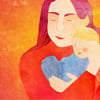
I really lost my temper. I hadn’t meant to. But she wouldn’t stop whining. I was trying desperately to get an article finished, and was frustrated and stressed. And she stood there behind me, telling me her stomach hurt and asking me if I could help her.
I mumbled, “One second,” and hoped she would go away. She didn’t. And when my “one second” had turned into twenty minutes, the whining hit an all-time high. Swiveling around in my chair, I said (okay, I yelled), “Can’t you see I am busy? Please leave me alone!”
And she did.
“Can’t you see I am busy? Please leave me alone!”She walked out of my office, and I heard her crumple on the stairs and start to cry.
Priorities.
Mine were most definitely out of whack. The second I heard her wail, I snapped out of the workaholic trance that unfortunately consumes me more than I would like to admit. I ran to her and held her and apologized. Her stomach was hurting. She needed her mommy. And ultimately, that is all that mattered.
As I sat with her, I tried to explain that sometimes mommies can make mistakes and lose sight of what is most important, and I asked for her forgiveness. I told her how lucky I am to have her, what a huge gift she is, and how grateful I am that G‑d felt I was worthy to be her mommy. I assured her that I love her and am here for her, even if sometimes I don’t respond as quickly as I should. I wiped away her tears. She hugged me and told me she loved me. And then I was the one who was crying.
I recently read an editorial in the New York Times in which a woman described her view of motherhood. She wrote that while being a mother is part of who a woman is, it shouldn’t be all of who she is.
I thought about her statement for a while. How completely backwards! I am all for women working outside the home, having careers and doing what they need to feel fulfilled and productive. But when it comes to whole and parts, there is no such thing as being partly a mother. I wonder, did this woman also rationalize when she was pregnant that it was okay to smoke or drink? After all, maybe she was only partly pregnant?
There is no such thing as being partly a motherWriting is part of who I am. Editing is part of who I am. Teaching is part of who I am. Being a mother is who I am. It embodies me. My children are me. And I hope they know it, since for better or worse, I am the only mother they have.
Judaism doesn’t define motherhood the way the rest of the world does. The Jewish perspective does not require that a woman have a child in order to be considered a mother. Chavah (Eve), the first woman, is called em kol chai, “the mother of all life,” before she ever gives birth to a child. Being a mother is the ability to be other-centered, to have another at your core. This is one of the reasons why the word for “womb,” rechem, shares the root of the word rachmanut, “empathy.” I don’t just feel badly for your pain, I feel your pain. Your pain is my pain. You are a part of me.
But coming back to Chavah, I wonder if we could read this phrase another way. The words em kol could mean “all mother”—not “part mother,” but all mother. She is the mother of all life, and she is all mother.
There are many roles I fill, many things I enjoy doing. But for most of them, I am truly replaceable. Granted, I hope not too replaceable. But some of the things I do could most definitely be done by others, maybe even done better. And even the things I excel in, that I feel passionate about, that I focus on . . . they are only parts of me. There are many writers, many teachers, many editors. And there are many mothers. But there is no other mother to my children. Only me.
Hopefully, next time I will be able to remember it without needing to first make my baby cry. After all, she is my world, they are all my world, and I am theirs. Em kol chai.






